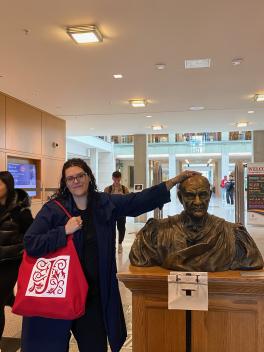
“What are you curious about?”— that was the question Elizabeth Shatswell, Correctional Education Manager at JSTOR Labs, asked at the outset of our most recent community meeting. Curiosity is not encouraged by carceral environments. It can be labeled rule-breaking when printed material is considered ‘contraband’. Cultivating curiosity can be difficult when the length of an incarcerated person’s sentence means that they don’t have access to most educational programming. And access to reliable information resources is severely limited within the walls of a prison. One of our inside members reflected: many years ago the library at SCI had subscriptions to major newspapers, but then the funding was cut.
Ms. Shatswell identifies as an education and digital equity enthusiast. But she was not always so excited about such matters. We learned that Ms. Shatswell entered prison at 17 years old with a life-equivalent sentence as a juvenile with a fifth-grade education. Several years into her incarceration, she was given a book about Greece and learned for the first time that the world was divided into continents. “Suddenly, the world became much larger,” she reflected. The drive to learn more about the world led her to pursue multiple associates degrees, completed largely by correspondence and handwritten papers. When inside members of Philosophy for Humans take OPEEP courses, they also complete coursework entirely through handwriting. Ms. Shatswell reported, and our inside members affirmed, gratitude when her instructors didn’t mark her down for illegible handwriting and instead asked, “what did you write here?”.
“I never thought I was coming home,” Ms. Shatswell admitted. Her education on the inside eventually became a way for her to improve the living conditions for herself and other incarcerated people around her. As a student in the first cohort of a bachelor’s program in the Freedom Education Project Puget Sound (FEPPS) in Oregon, she gained access to a pilot version of JSTOR, a search engine that includes PDFs of scholarly articles. She learned how to use JSTOR to find much needed information, including evidence-based care for someone with dementia. This information led to the formation of a team of incarcerated people at the facility where she resided who were trained in dementia care, thereby dramatically improving the support provided to elders in that carceral community. When Ms. Shatswell made parole after her juvenile sentence was reconsidered in light of the U.S. Supreme Court ruling that held life and life-equivalent sentences for juveniles was unconstitutional, she took the story of her use of JSTOR and the need for evidence-based dementia care for incarcerated people international. By the end of this year, her second year of freedom, she will have visited two countries to share her story.
“The people closest to the system are closest to the solution,” Ms. Shatswell affirmed. She is now part of a team, at least half of whom are formerly incarcerated, working to extend access to and deepen the use of JSTOR within prisons. We learned that JSTOR is not only available within ODRC facilities, it is accessible in 23 countries—for a total of over 1500 sites worldwide. Over the past year, people within ODRC facilities have searched JSTOR almost 450,000 times. And a search of the journals, books, and reports in the 68 approved disciplines offers access to over 15 million items in the JSTOR PEP database. Ms. Shatswell offered a inspiring portrait of the power of information access and information literacy for currently incarcerated people, and the need for formerly incarcerated people leading the charge for non-reformist reforms of the carceral system.
ODRC’s approval of JSTOR is an important step in a much-needed direction. And there is more work to be done to solidify access to this information resource. At SCI, JSTOR used to be accessible through a few computers in the library—however, recent renovations resulted in restricted access to JSTOR. We are hopeful that fuller access will be restored soon. Without education tablets, OPEEP students can only locate and read articles on JSTOR while sitting at a common library terminal. Even if an incarcerated student can afford the 10 cents per page cost, printing out articles is not yet technologically possible. Finally, few are thoroughly trained on how to search JSTOR. Boolean operators and other search features are largely unknown to incarcerated people.
When the library is staffed by only one professional librarian who is mandated by law to support the use of Lexis-Nexus for legal research undertaken by residents at SCI, there is currently no one else available to train and reinforce best practices around the use of JSTOR for curious residents at SCI. Philosophy for Humans plans on keeping this information resource in our sights, and build educational programming to fill these gaps, where possible.
